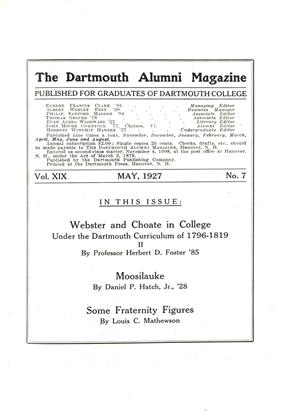by Daniel Chase. (Ernest H. Chase '14) TheBobbs-Merrill Company, 1926. Reviewed by STEARNS MORSE
In Hardy Rye Mr. Chase attempts' too much, perhaps, but what he attempts is surely worth doing. He has set for his task the portrayal of four New England generations and the beautiful yet stern relation of attraction and repulsion that exists between them and their land. The book begins with old Elias Wheelock striving grimly to hold his sons to the land against the glamorous pull of the West as it is personified in a returned forty-niner. He largely fails : two of his sons go westward; he himself meets a tragic death in his vain and desperate struggle; his daughter elopes with the forty-niner; only one son and old Elias's grandson, Wes, remain on Wheelock's. Throughout the rest of the book Wes remains the avatar of the old man's love for his land. And at the end of the book the struggle is still recurring: will Wes, now himself an old man, have to sell the farm to Ziehl, the 'Bohunk'? Or will Mel, old Wes's grandson, reject a moderate degree of commercial success as a western manager of the aluminum company for which he has been working as salesman since his return from the World War and come back to a more muscular existence on the land? In the end the land conquers over the West and old Wes retires in peace to Jalaam Town with Wheelock's still in the family.
Between these terminal events Mr. Chase, with considerable skill, develops his theme. Through the fortunes and reverses of this family—its births, deaths, marriages, enterprises and failures—he reveals to us much of the decadent and dying New England we know, the land of "the old men, the tired old men with faded gray eyes, the old men living in forgotten nooks of the clipped and wasted hills, the last survivors of an almost vanished race, waiting and holding with tenacious hands".
It is not strange, I think, that Mr. Chase has not always been able to do more than suggest the epic quality of his theme. There are too many events, too many figures for the size of his canvas. This is bound to result either in the confusion of a crowded picture or in rapid incomplete sketches of the characters and a consequent dramatic thinness at critical situations. The latter is what has happened. In spite of the crisp abrupt narrative method the new technique has given us a method of which Mr. Chase has skillfully availed himself, I miss the full dramatic value of some of the crucial episodes just because there are so many and because Mr. Chase has not had time to prepare for them. Nor has he had time to brush in his characters with more than a few rapid, though deft, strokes. In introducing us to new generations Mr. Chase has had to sacrifice the old. Anna, for instance, (the girl Wes Wheelock gave up) is too vivid a figure to lose sight of as she fades into age and into the background. If he had not tried to do quite so much—
I am being thus querulous because I liked the book. Having tried to indicate wherein I feel that Mr. Chase has come short of the goal he set himself I should like to indicate wherein for me, he has succeeded. He has skilfully suggested the fatal hold the soil has for those who cultivate it. He has caught very closely the rhythm of every day life. The topography of Jalaam Town, Jalaam Plain, Jalaam Stream is very vivid to me. Because of Mr. Chase's sure use of homely detail I have a very real sense of life being lived there: of women busy in kitchens, of milk streaming into pails in lantern-lit barns, of black earth being turned, of bells ringing the hour into still frosty air. The result is a definite mood, an emotion from the book—quiet, sure, serene. It is one of those books—of which, after all, there are not many—which may be said to catch New England. It is a gentler, more mellow New England than I have known it—more the New England of Alice Brown than of Ethan Frome or of Robert Frost but it is indubitably New England.
Finally, though on the strength of this book it is not possible to prophesy what more Mr. Chase may have to say I shall await whatever that may be with considerable interest.
 View Full Issue
View Full Issue
More From This Issue
-
 Article
ArticleWEBSTER AND CHOATE IN COLLEGE
May 1927 By Herbert Darling Foster '85 -
 Article
ArticleTHE UNDERGRADUATE CHAIR
May 1927 -
 Article
ArticleMOOSILAUKE
May 1927 By Daniel P. Hatch, Jr. '28 -
 Article
ArticleSOME FRATERNITY FIGURES
May 1927 By Louis C. Mathewson -
 Article
ArticleDARTMOUTH STUDENTS SAID TO BE IRRELIGIOUS
May 1927 -
 Class Notes
Class NotesClass of 1921
May 1927 By Herrick Brown
Books
-
 Books
BooksNotes on a literary equilibrist whose translations, according to one author thus translated, may rival the original.
January 1977 -
 Books
BooksPAUL KLEE AND CUBISM
OCTOBER 1984 -
 Books
BooksCOMPUTER COACH.
OCTOBER 1971 By ARDEN BUCHOLZ '58 -
 Books
BooksTHE STRANGE WOMAN
November 1941 By H. M. Dargan -
 Books
BooksTHE MEDALLIC PORTRAITS OF SIR WINSTON CHURCHILL.
FEBRUARY 1973 By HENRY GRUNTHAL -
 Books
BooksMEN, CITIES AND TRANSPORTATION: A STUDY IN NEW ENGLAND HISTORY
October 1948 By Robert E. Riegel.


